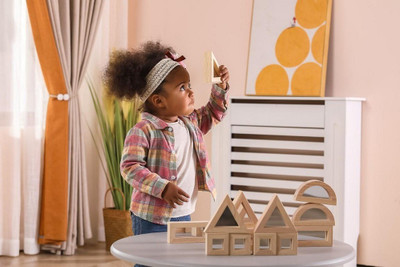How Play Can Help Prepare Kids for School
May 08, 2025
Play is often seen as just fun - but it's also one of the most powerful ways children prepare for school. At KindtoKidz, we believe that play builds the skills, confidence, and curiousity little learners need for a smooth and joyful transition into the classroom. Here’s how educational toys help set the stage for success.

Essential School-Ready Skills Children Learn Through Play
Before a child ever sits at a classroom desk, they are already developing vital skills through play. Educational toys nurture:
Cognitive Development: Solving puzzles, matching games, and construction play help children sharpen problem-solving skills, memory, and logical thinking. Activities that challenge the brain in playful ways encourage children to think flexibly, plan ahead, and approach challenges with confidence - all essential for tackling classroom tasks. Check out some Qtoys puzzles for brain-boosting fun.
Language and Communication: Toys like alphabet play sets, storytelling sets, and pretend play kits encourage rich language development and confidence in expressing ideas. Through creative role-play and narration, children learn to structure sentences, expand their vocabulary, and understand the rhythm of conversation - a key ingredient in classroom discussions.

Fine Motor Skills: Manipulative toys such as threading sets and lacing toys support dexterity and hand-eye coordination — important for writing, drawing, and using classroom tools like scissors or rulers.
Social and Emotional Skills: Through role-playing and cooperative games, children learn to share, take turns, empathise, and collaborate — all essential for positive classroom interactions. Group play also teaches conflict resolution and patience, skills that will come in handy in a bustling classroom environment.
Academic Concepts Learned Through Play
Educational toys weave early academic foundations naturally into everyday activities:

Math Concepts: Sorting toys, counting beads, and number puzzles gently introduce numeracy. Concepts like counting, grouping, pattern recognition, and simple addition or subtraction often emerge naturally during play.
Science and Nature Awareness: Magnetic construction sets and nature-based toys, spark early exploration of natural sciences. By building, observing, and asking questions during play, children develop scientific thinking skills like hypothesising, experimenting, and drawing conclusions.
Literacy Foundations: Letter recognition, sequencing, and storytelling skills grow through toys like Alphabet Puzzles. Repeated exposure to letters and sounds through play helps build strong phonemic awareness, which is critical for future reading success.

Choosing the Right Toys: Tips for Parents and Educators
Selecting the right educational toys can make a real difference in preparing a child for school. Here’s what to look for:
Open-Ended Play: Choose toys that can be used in many ways used in many ways to spark creativity and imagination. Open-ended play allows children to lead their own learning journey, promoting critical thinking and innovation.
Developmental Value: Select toys that support specific skill areas — fine motor, cognitive, language, or emotional development. A well-chosen toy can help bridge developmental gaps and build on a child's natural strengths.
Age-Appropriate and Safe: Always opt for non-toxic, sustainably made toys suited to your child's age and stage. Our collections at KindtoKidz are carefully curated to ensure safety, quality, and learning value. We believe that beautiful, thoughtfully designed toys inspire deeper, more meaningful play experiences.

Play isn’t separate from learning - it’s where learning begins. When it’s fun and engaging, children absorb knowledge naturally, without the pressure of formal instruction. Choosing well-made educational toys is more than just a purchase; it’s an investment in lifelong skills. Through play, children develop school-ready abilities, build confidence, and spark a love of discovery that will guide them from their very first day - and every day after.


